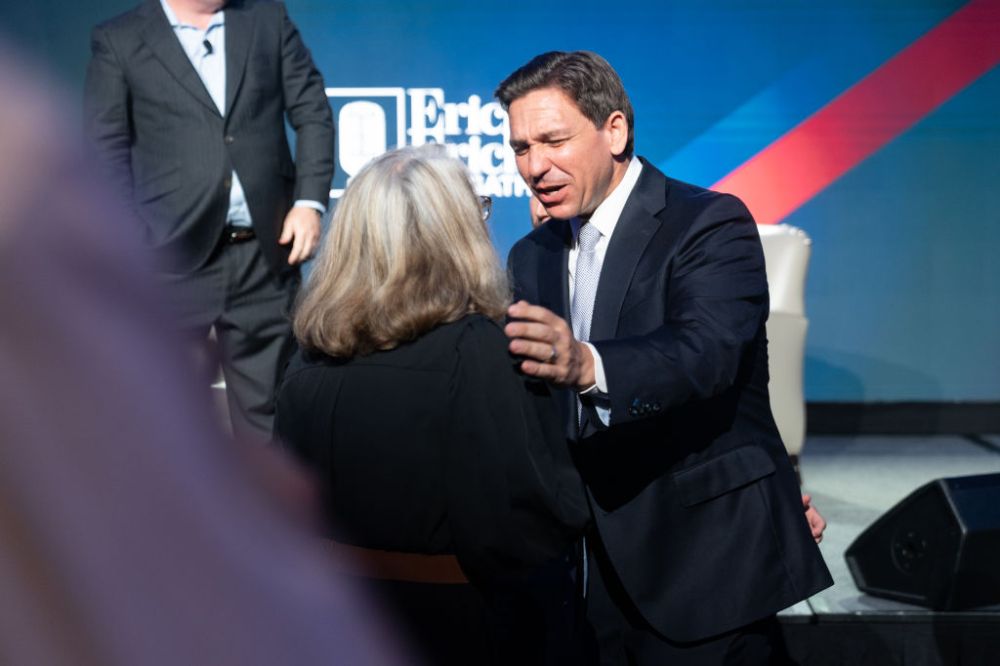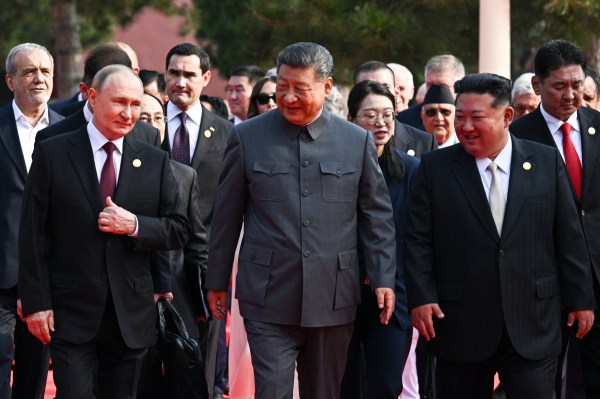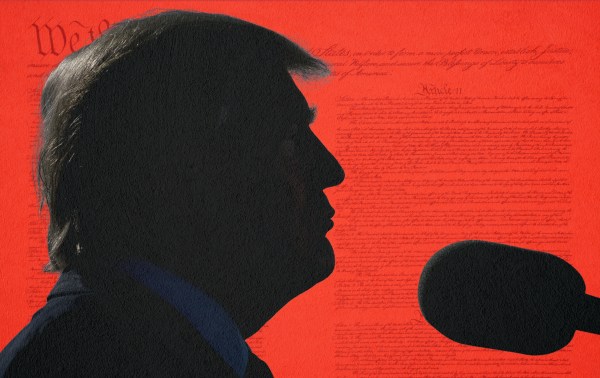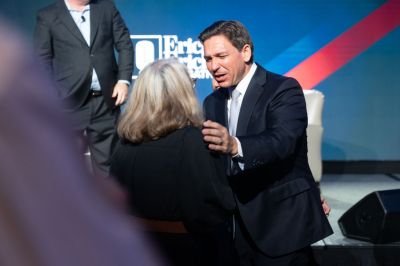Happy Monday! Unless you’re Rudy Giuliani, the former New York City mayor and Trump attorney, who hit a new low last week when he was indicted in the Fulton County election case. “His fall from grace is almost complete,” Ken Frydman, who served as Giuliani’s former campaign press secretary during his 1993 mayoral race, told NBC News. “His only goal should be to die a free man.”
Up to Speed
- The New York Times has new details on the collapse of Hunter Biden’s plea deal with federal prosecutors: “Earlier this year, The Times found, Mr. Weiss appeared willing to forgo any prosecution of Mr. Biden at all, and his office came close to agreeing to end the investigation without requiring a guilty plea on any charges. But the correspondence reveals that his position, relayed through his staff, changed in the spring, around the time a pair of I.R.S. officials on the case accused the Justice Department of hamstringing the investigation. Mr. Weiss suddenly demanded that Mr. Biden plead guilty to committing tax offenses.”
- Former White House chief of staff Mark Meadows has reportedly told federal prosecutors that he does not recall Donald Trump ever discussing, or ordering, the declassification of documents he took from the White House upon leaving office, ABC News reports. This would appear to contradict the former president’s claims that he declassified the materials before he brought them to Mar-a-Lago, his residence and private social club in Palm Beach, Florida.
- President Joe Biden will take a brief break today from his summer vacation in Lake Tahoe, California, to travel to Maui to meet with wildfire victims, first responders, and Hawaii officials as search efforts continue.
- Former Arkansas Gov. Asa Hutchinson said Sunday he has qualified for the first Republican presidential debate in Milwaukee on Wednesday and that he plans to participate.
- Sen. Mitt Romney of Utah told the Wall Street Journal he expects to make a decision about whether he will run for reelection in the fall. His allies are waiting, including investment manager David Nierenberg, who fundraised for the Republican’s 2008 and 2012 presidential campaigns and thinks his age and family will likely be the biggest factors dictating his decision. “I do believe that if he were to decide to run again, we would have no problem raising the money to run a great campaign, and I believe that we would win,” Nierenberg, who plans to fundraise for Romney again if he runs for reelection, tells The Dispatch. “So it’s not a political calculation here. Rather, it’s a choice of: ‘What do I want to do with the time I have left?’”
- President Biden’s reelection campaign will launch a $25 million advertising buy Wednesday in seven battleground states, with an emphasis on black and Hispanic media. The spots, highlighting Biden’s economic record, are set to air on cable and broadcast television and digital platforms in Arizona, Georgia, Michigan, Nevada, North Carolina, Pennsylvania, and Wisconsin.
- In Iowa, presidential contender Vivek Ramaswamy was endorsed by state Treasurer Roby Smith. The Republican is the first statewide elected official to endorse in the Iowa caucuses.
DeSantis Squeezed by Trump’s Debate Absence
Ron DeSantis is under increased pressure to produce a breakthrough in Milwaukee Wednesday evening after frontrunner Donald Trump announced he would skip the first Republican presidential debate.
A home run performance, combined with the former president’s absence, stands to vault the Florida governor back into contention for the 2024 nomination after a long summer slide. Deliver anything less on a debate stage full of compelling underdogs and second-tier longshots, and DeSantis risks being firmly overtaken as the consensus alternative to Trump heading into the crucial, post-Labor Day phase of the GOP primary campaign.
“DeSantis gets a make or break moment. He is in the middle of a monthslong slide and either he dominates to pull out of it or someone else replaces him as the alternative to Trump,” veteran Republican strategist Brad Todd tells The Dispatch. “As for Trump, he misses an opportunity to command the stage. It’s probably a mistake and it’s certain he will have FOMO next time.”
“Upside for DeSantis: A great performance re-cements him as the only Trump alternative and he can do that without having to attack Trump,” adds Michael Meyers, a GOP consultant in Michigan, a critical battleground state. “Downside is that without Trump, he cannot stand side by side with him and prove his mettle sufficiently. Best he may be able to do is prove he is the best of the next best.”
On the eve of the inaugural Republican debate, hosted by Fox News, Trump leads the Republican field nationally, garnering 55 percent in the RealClearPolitics average. DeSantis has fallen to 14.4 percent, followed by wealthy biotechnology entrepreneur Vivek Ramaswamy (who boldly predicts eventual victory over the former president) at 7.1 percent. Trump also substantially outpaces the competition in Iowa and New Hampshire, the states that vote first and second, respectively, in the primary.
A fresh poll from expert Iowa pollster J. Ann Selzer, commissioned by NBC News, the Des Moines Register, and Mediacom, shows Trump way ahead among likely caucusgoers, with 42 percent, compared to 19 percent for DeSantis and 9 percent for Sen. Tim Scott of South Carolina. Citing his overwhelming advantages, Trump said Sunday in a social media post he was skipping all “debates.” That would appear to include late September’s scheduled faceoff at the Ronald Reagan Presidential Library and Museum in Southern California.
This decision ups the ante for DeSantis, whose flagging presidential bid desperately needs a turnaround. His campaign is attempting to shift the focus to Trump’s absence. “No one is entitled to this nomination,” spokesman Andrew Romeo posted on social media. “You have to show up and earn it. Ron DeSantis is looking forward to being in Milwaukee Wednesday to share his vision for what he will do as president to reverse our decline and lead an American revival.”
Trump is using a pre-taped interview with populist media personality Tucker Carlson to bigfoot the debate and steal attention from his rivals. Carlson, fired by Fox News earlier this year, has lately aired programming on X, formerly known as Twitter. But the 45th president may come to regret his decision to forgo participating. (The Trump campaign did not respond to a request for comment.)
In a national poll of Republican primary voters conducted in mid-August and released Monday, 66 percent said “Trump should debate.” That number was even higher—77 percent—among self-described “Trump supporters.” Indeed, among Trump’s few major losses in the 2016 GOP primary came after he skipped a debate in Des Moines held days before the Iowa caucuses, and some Republican operatives believe the former president is making a strategic error by being a no-show at the Fiserv Forum.
“Trump will be front and center in the debate, regardless of whether he shows up. The only difference is that if he’s on stage, he can actually defend himself and counterpunch,” says Alex Conant, founding partner of Firehouse Strategies, the bipartisan government affairs firm in Washington that commissioned the poll.
“All the candidates need to persuade GOP voters that they’re a better choice than Trump. They’re going to do that regardless of whether he’s on the stage,” adds Conant, a GOP operative who advised Sen. Marco Rubio of Florida when he ran for president in 2016.
For Now, Trump Stays Mum in Contested Senate GOP Primaries
Donald Trump isn’t known for subtlety, but he’s been oddly quiet on endorsements this cycle, staying on the sidelines in every Senate GOP primary aside from an early seal of approval for consensus candidate Jim Banks in Indiana back in February.
It’s still more than a year out from Election Day and Trump (sort of) has a primary race of his own to worry about—not to mention the handful of indictments that seem to capture the former president’s every waking moment. But as the cycle moves forward, many Republican operatives expect Trump will start to put his thumb on the scale in a number of contested Republican primaries, as he did during the 2022 midterms. In that cycle, Trump backed several weak candidates in key battlegrounds, helping cement Democrats’ narrow control of the upper chamber.
Sen. Steve Daines of Montana, the National Republican Senatorial Committee chairman, has done his best to prevent a repeat. Earlier this year, he endorsed Trump’s reelection bid, hoping the former president would repay the favor by backing the NRSC’s preferred candidates.
“You look back—his endorsement certainly was a significant factor in primary elections,” Daines told NBC News earlier this year. “Where there are candidates that are not able to win general elections, we’re going to be doing all we can to dissuade them … And where there are candidates who can win general elections, do all we can to persuade them.”
Whereas Senate Republicans’ hopes of flipping the chamber last cycle rested on perennially purple states like Arizona and Pennsylvania—two battlegrounds that are on the map again this cycle—the GOP has the added opportunity this cycle of flipping three red-leaning Democrat-held states that Trump carried handily in 2020: Ohio (Trump +8), Montana (Trump +16), and West Virginia (Trump +39).
The Trump endorsement factor isn’t much of a concern for the NRSC in Ohio, where the organization plans to stay neutral.
But it’s certainly a factor in Montana, as declared NRSC-backed candidate and wealthy businessman Tim Sheehy prepares for a likely challenge from Freedom Caucus GOP Rep. Matt Rosendale, who lost to Democratic Sen. Jon Tester in 2018. (Sheehy allies maintain privately that Rosendale’s decision to rebuff a phone call from Donald Trump during Kevin McCarthy’s January speakership fight have soured his chances of scoring his endorsement, and CNN reported earlier this year that Trump has already told Rosendale he will not endorse him if he runs.)
And Trump’s endorsement will likely play heavily in West Virginia, where Democrat-turned-Republican Gov. Jim Justice and GOP Rep. Alex Mooney are both vying for Democratic Sen. Joe Manchin’s seat.
The NRSC has thrown its weight behind Justice, the state’s popular governor, in hopes that his deep pockets and high name ID will give Senate Republicans the best chance of pressuring Manchin into retirement. (Manchin’s 2024 plans still remain unclear.)
In a bid for the former president’s support, Justice’s campaign points to Mooney’s endorsement from the Club for Growth, an anti-tax spending group that is spending heavily on ads urging Republican primary voters across the country to move on from Donald Trump.
“Governor Justice and President Trump are great friends, they speak regularly, and Governor Justice has endorsed President Trump and is his most prominent supporter in West Virginia,” Roman Stauffer, Justice’s campaign manager, tells The Dispatch.
Meanwhile Mooney’s campaign is trying to turn Senate Republicans’ endorsement of Justice against him. “The Congressman has endorsed President Trump and would of course like to have his endorsement again,” says John Findlay, Mooney’s campaign manager. “The President has not indicated to the Congressman that he would endorse him, he has also not endorsed Jim Justice who didn’t even vote for him in 2016.”
Senate Republicans are hopeful Daines’ strategy will play to the party’s favor come Election Day. “He’s entitled to some latitude considering the complexity of the political environment we are entering into,” GOP Sen. John Cornyn of Texas told CNN in April of Daines’ decision to back Trump. “The goal is to win the majority back. I don’t really care what the tactics are. I do care what the results is. If this helps achieve that result, I’m fine with it.”
Spokesmen for Trump and the NRSC declined to comment for this story.
Notable and Quotable
“Just because I’m alone doesn’t mean I’m wrong. … You get to a point in life where it’s not like sitting alone in high school in the cafeteria.”
—GOP Sen. Mitt Romney of Utah speaking with the Wall Street Journal about bucking the Senate Republican party line, August 20








Please note that we at The Dispatch hold ourselves, our work, and our commenters to a higher standard than other places on the internet. We welcome comments that foster genuine debate or discussion—including comments critical of us or our work—but responses that include ad hominem attacks on fellow Dispatch members or are intended to stoke fear and anger may be moderated.
With your membership, you only have the ability to comment on The Morning Dispatch articles. Consider upgrading to join the conversation everywhere.